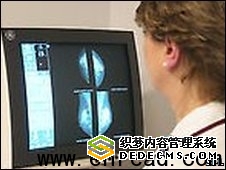US scientists have found a way they believe may cut the number of mistakes made by medical staff looking for breast and cervical cancers.
美国科学家找到一种方法,可以减少医务人员在检测乳腺癌和宫颈癌时犯错误的次数。

Radiographers look for abnormalities among many normal cases
Writing in the journal Current Biology, the researchers say that people in all walks of life各界,各行各业 looking for rare events often miss them.
But accuracy improves if people first get used to looking at samples of what they need to find.
Screening professionals said it was a recognised problem.
They carried out a study which showed that the number of mistakes made during a visual search varied according to the chances of finding the "target".
Time searching
Twelve volunteers were asked to identify target items in X-ray images of assorted混杂的,组合的 objects in empty bags.
The accuracy of their search was monitored as the frequency of the target was altered.
The laboratory results are to be tested in clinics and airports.
The study found that the amount of time the observers spent looking for something depended on how often if appeared.
"If you don't find it often, you often don't find it," said lead author, Jeremy Wolfe of Harvard Medical School.
"If you are trying to find 20 cases of breast cancer from 40 mammograms乳房X线照片, you'll find more of them than if you look for the same 20 cases from 2,000 mammograms.
"From an evolutionary point of view it makes sense for people to give up searching more quickly if they don't expect to find what they were looking for," he said.
"If you know berries浆果类 are there, you keep looking until you find them. If they are never there, you don't spend your time hunting."
But this causes difficulties when the aim is to accurately spot rare phenomenon like cancers or bombs in travellers' luggage.
Instant feedback
The authors say that one benefit of staff doing a booster exercise before starting work is that it helps them to visualise what they are looking for and improves their search success rate in the subsequent后来的,随后的 session.
They say that this kind of exercise could also sharpen search skills by providing instant feedback.
In the real world it often takes many months for radiographers放射线技师 and radiologists放射线研究者 to discover if they have made mistakes.
The research has been welcomed by the Society of Radiographers.
Chief executive Richard Evans said: "The difficulty of spotting abnormal results among large numbers of normal cases is a recognised problem.
"I look forward to seeing more details about this research, but radiographers would welcome techniques which help ensure the best possible standards."
He pointed out that the NHS already monitors the performance of everyone involved in breast screening through a regular audit审计,查账.
更多此类内容:英语科技新闻

